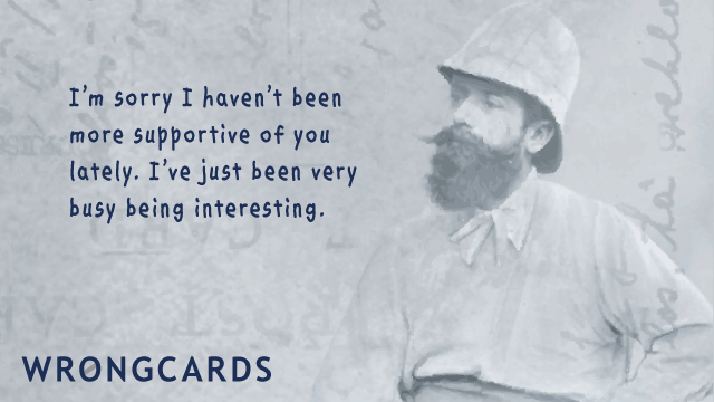For a few years, I maintained an orthology database for our lab. I remember a lot of complex, undocumented spaghetti code which, to the best of my knowledge, computed orthologous genes via a rather clever algorithm. I’d be happy to explain to you how it all worked, but that would likely require at least one full metric cup of whiskey just to get me back in the flow. And whiskey would obviously provoke further digression until my explanation resembles a Fibonacci sequence drawn in crayon. What’s a Fibonacci sequence? That too will require a cup of whiskey.
In due course, my respectable career came to a clean and dignified end. I’d enjoyed myself, despite the general feeling that I’d been wasting my life. Matters improved once I started writing books. Nowadays, I live with a certain excitement about whatever I’m writing; be it this newsletter or this one rather long novel I’m working on now. (Just a few more weeks now, hopefully.)
We recently spent a week in a beach town called Noosa. We were up early each morning, body-surfing with my brother-in-law and his kids. Each afternoon, I worked on the novel for six hours. It was a good balance for me, and it was great to spend time with them. He and my nieces were a significant reason for me bringing my girls back to Australia last year.
My brother-in-law is still a bit bewildered how I ended up working in science, or with computers, or writing books. He visited my office at Harvard years ago — if he hadn’t, I suspect he’d just think I was mad, and was making it all up. My back story still doesn’t make much sense to him, I think. But I appreciate his perplexity. I share his perplexity.
I spent years working hard for the usual reason: dire financial necessity. But fortunately, my work life granted me all sorts of silly situations and moments that I, at least, found spiritually sustaining.
I have a mate who had worked in the library at the medical school; a successful, popular middle manager — I know, right? A remarkable human achievement. My friend, like me, suffers from an incurable streak of mischief.
One day, he met a professor who was moving his office into the building. My friend said to the professor, “Hey, that’s a nice shirt.”
The man thanked him.
He stared longingly at the professor’s shirt for a moment, and then said, “Can I have it?”
“Absolutely not!” cried the man indignantly, his face a mask of horror.
The two men never spoke again. The professor passed my friend every day for the next six years, never once acknowledging his existence.
“To this day,” my friend says even now, smiling wistfully, “I have no idea why I said it. I suppose I wanted to see what would happen?”
Like me, he’d found his existence at Harvard a bit incongruous. We both had relatively humble beginnings. He’d spent a few years of his childhood living in a yurt on a farm somewhere west of Chicago. “My mother had a spinning wheel. She knitted me a sweater once, made from dog fur. It was great except when it rained. People would be looking around in confusion, and say, ‘Why do I smell wet dogs?’”
Anyway, I just think it’s remarkable that he and I managed to exit Harvard without being thrown out on our ears.
But I remembered that story the other day when I was diving beneath a wave alongside my brother-in-law at Sunshine Beach. It reminded me that my life has always been somewhat odd. Sometimes I think there’s just too much contrast and incongruity. Events fail to juxtapose credibly within my mind.
Part of this is that it’s been mentally difficult to adjust to moving back to Australia. Eighteen years was a long time to be away. And I miss my house in Cambridge, gone now from my life forever. I miss autumns and snow, and leading my little girls in rain boots past those strange New England houses. Our normal existence is gone.
But nowadays, my six-year-old daughter, Hattie, runs fearlessly into the surf and that’s a positive development. She’s asked me a few times when she can have a surfboard. Both girls have adjusted easily to Australia. Adults take longer to process things, I suppose. It took me four years to adjust to Boston, I think.

But let me go back to the beginning. Before I started writing this newsletter, I was reading a scientific paper published by The New England Journal of Medicine, and I felt a strange jolt of recollection. I know The New England Journal of Medicine, I thought; they’re those weirdos on the Sixth floor.
I glanced upwards involuntarily. For eight years, I’d worked a few floors below them. And to show how ignorant I was back then, I didn’t know NEJM was the most trusted, reputable, authoritative medical journal in the United States. I hadn’t heard of it.
To me, The New England Journal of Medicine was not a journal but a place where people were somewhat annoyed with me.
In those days, they inhabited most of the western half of the building that houses the Countway Library of Medicine. For some odd reason, the most south-westerly corner of the sixth floor used to be the library’s staff room. I don’t know why. All I knew is that we had to travel kind of a long way through the building whenever we found ourselves in need of tea.
Back then, everyone in the library had to take the eastern, furthest elevator, and walk around the long way to reach the staff room on the southwest side. If you didn’t, if you took the western elevator instead, you emerged right in the middle of the offices of NEJM. An effective shortcut, yes, but they didn’t like people using it. And by ‘people’, I’m referring to myself, because I was the only person who did it.
Now look — when I was hired, I was told to help everybody in the library with their computers. My boss neglected to mention that my coverage didn’t extend to New England Journal of Medicine; he didn’t mention they had their own tech support.
Therefore, for six months I simply assumed I was NEJM’s IT guy. And their requests for me not to walk through their offices made me suspect that, maybe — just maybe, they were acting a bit uncool towards me. A reasonable conclusion if you live in Boston, where people are uncool to each other all the time.
To reiterate, cutting through NEJM was the shortest route from my office to the library’s staffroom; so why wouldn’t I? They would see me and politely ask if I minded going around the other way next time, please and thank you. And each time, I’d be friendly and apologetic and promise them I would. They were clearly being obtuse. What did they expect me to do? Comply? I’m their IT guy! IT guys go where we please! That’s the first rule of being IT Guy. That, and we’re allowed to wear hoodies.
By the way, don’t tell anybody this, but I also have a sneaking suspicion that I may suffer from pathological problems with authority.
Meanwhile, NEJM put up signs — signs for me, specifically — informing me I had to go the long way round, instead of through their offices. It’s not that I minded all that much; the long way meant passing all those nice people in Harvard Health Publications who seemed to be much cooler overall. But I ignored their helpful signs. I don’t know. It just seemed so unnecessarily passive aggressive.
Eventually The New England Journal of Medicine seized the entire sixth floor of the building, including the library staff room, and made the entire floor a no-go zone for all non-employees. I’m not saying they did that solely because of me, but I have reason to suspect that my name came up in the meetings about it at least twice.
Not long afterwards, I found out that I wasn’t— and never had been — NEJM’s IT guy and that I had been, in actual fact, a trespasser.
Live and learn. I suppose.
One last story. One day, shortly after the renovations on the sixth floor were finished, I stepped into the western elevator on the ground floor, right behind a man in a lab coat. I punched the button for Level Two.
The button for Level Six was already illuminated. The man in the lab coat made an audible sigh.
“Everything alright? I asked.
“I just … wish you hadn’t pressed that button.”
I studied the man; mid-forties, brown hair, glasses, short beard. Important — terribly important — famously important, no doubt, but also — and here’s the point— obviously important. So why hadn’t I done the decent, civilized thing, and waited for another elevator? Couldn’t I see this one was occupied by somebody important?!
I had slowed his ascent. And now he would be late for an important meeting with the world’s most trusted medical journal.
“Sorry — which button did you mean? This button?” I stabbed the one labeled Level Three. “Or did you mean one of these?” I stabbed Four and Five. Each time, the man emitted a muffled groan.
Please note, I have never once claimed to be mature.
With chaste affection,
Kris St Gabriel




